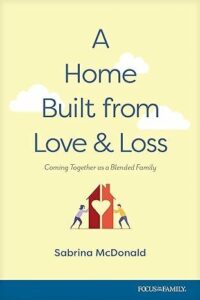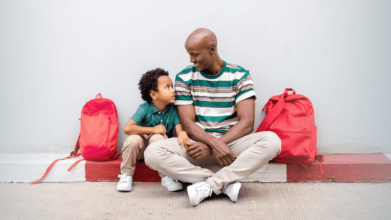Preview:
Sabrina McDonald: Because my son was old enough to know this is a stranger. Who is this man? He hadn’t spent that much time with him. I mean we were, we were only dating six months before we were engaged and got married. So, um, he had no… Why does this guy get to come in here? You know, all the other men that come in our house, my brothers, my dad, they were all subject to me, you know, as the authority in the home and now this man comes in here and he’s in my chair? He’s watching my TV? He’s deciding what we have for dinner?
End of Preview
John Fuller: Hm. That’s Sabrina McDonald describing some of the unique challenges facing remarried couples and stepfamilies, and, uh, she’ll offer insights about how these families can rediscover hope and find success in God’s eyes. Uh, thanks for joining us today for Focus on the Family with Jim Daly. Uh, we’re gonna be covering that topic today. I’m John Fuller.
Jim Daly: You know, John, from time to time we come back to the subject of blended families or stepfamilies because they need our support and encouragement. You know, so often, and I do this too, you don’t know the circumstances of what happened. Uh, was it a divorce or a death in the family that did this? Uh, for all kinds of reasons people remarry and, you know, for us as Christians, I don’t think it’s about what was but what the Lord intends for you now and how do you keep moving and do so in a way that reflects, uh, His spirit, His will for you? And that’s why we wanna come back to this. Sometimes people will let us know they don’t appreciate us talking about blended families. Uh, I would just encourage you to open your heart a little bit and make sure we’re on the same page talking about God’s spirit for those families, for those kids, to be in a loving, uh, family that is so stabilizing for those children. And remember, these families are typically born out of loss, uh, as I said.
John: Yeah.
Jim: It’s the loss of a husband or wife, a mom, a dad, and these families have to pick up the pieces and when mom or dad remarries, how do we do this well and do it in such a way that honors the Lord?
John: Yeah, and in fact, Jim, there are so many, uh, stepfamilies in the Bible. You’ve got Abraham and Sarah and Hagar and, uh, Joseph and his half-brothers. Uh, there was tension. There were (laughs) difficulties in those relationships.
Jim: Yeah.
John: And Jesus himself grew up with a stepfather and, uh, of sorts. They had to figure out how to do a life together and, uh, boy, there were just lots of things going on.
Jim: Well, that’s it. And so I believe today as we cover this topic, today and next time, uh, this will be really helpful for families that are in that spot and also for the families around them, their friends, to better understand how to care and nurture those relationships.
John: Yeah, if we look around we know a lot of stepfamilies and we have a wonderful guest today who’s gonna help us kinda better understand their world. Uh, Sabrina McDonald is an author and speaker who addresses topics of marriage and parenting and stepfamilies and faith, and she became a single mom when her husband, David, was killed in a car accident. Uh, eventually she remarried Robbie, uh, whose wife, Carrie had died from cancer. Now between them, Robbie and Sabrina have four children ranging in age from 13 to 33, and Sabrina has written a book published by Focus on the Family, uh, and that’s the basis for our conversation today. It’s called A Home Built from Love and Loss, and you can find out more at focusonthefamily.com/broadcast.
Jim: Sabrina, welcome to Focus.
Sabrina: Thank you. It’s good to be here.
Jim: So, so good to have you. Let’s start with the love story of you and Robbie. Uh, it didn’t really, uh, click the first time you saw each other. You and Jean share that sentiment. (laughs)
Sabrina: (laughs) Yeah.
John: Yeah. (laughs)
Jim: I was in the same boat, so it was like, “Oh, whatever.” (laughs)
Sabrina: (laughs)
Jim: And I was struck and, uh, so talk about you and Robbie and how you met and what it was like.
Sabrina: Yeah. Well, we met on an internet dating site. Um-
Jim: Very common.
Sabrina: … which is common now.
Jim: (laughs)
Sabrina: At the time it was somewhat common. It was kind of a newer, you know, kinda getting there as more popular. But, um, he had contacted me originally and I thought, “Oh, no. This guy? He, his wife just died. I don’t wanna talk to him.” And then about a year later-
Jim: You know that doesn’t sound very nice. (laughs)
Sabrina: Yeah. (laughs) Well, coming from someone whose husband had died-
Jim: You’re right. Okay.
Sabrina: … you know, I knew that he was not ready yet and-
Jim: Was it him that wasn’t ready or you?
Sabrina: No, I was ready.
Jim: Okay. All right.
Sabrina: I mean, you know, are we any… Are any of us really ready?
Jim: That’s a hard situation, not to make light of that.
Sabrina: Yeah. (laughs) Yeah.
Jim: But both of you had lost your, your first spouses and, uh-
Sabrina: Right.
Jim: … that does have a lot of-
Sabrina: Mm-hmm.
Jim: … trauma in it.
Sabrina: Yes, definitely, and I knew that he was going to use this relationship as a way to feel better and I didn’t want that. I really wanted to wait a little longer and that’s when we got together about a year later.
Jim: Okay.
Sabrina: Uh, he, I got back online. I had been off for a while. Got back on. He was there again and he started to contact me and I thought, “He’s too old for me. His kids are too old.”
Jim: What? He’s not that much older, let’s be fair.
Sabrina: He’s, he’s 10 years older. He’s 10 years older.
Jim: 10 years! Oh, my goodness.
Sabrina: (laughs)
Jim: (laughs)
Sabrina: It’s not crazy but it was… I thought, “Nah, I don’t, I don’t…” To me that, the way things lined up didn’t line up very well. Our lives didn’t line up. He was on the back end. He, his youngest was 14 and I thought… My kids were, you know, three and five.
Jim: Mm-hmm.
Sabrina: And I thought, “He’s, he’s on the back end of this. He’s getting ready to, to move into a new part of life and, um, I’m just getting started.”
Jim: Right.
Sabrina: You know? And, uh-
Jim: But d- you did see a scripture that kinda spoke to that, right? 1 Samuel?
Sabrina: I did. I did. I was thinking about it and thinking about it and I said, “You know what? The Lord looks on the heart. He doesn’t look on the outward appearance.” And so why am I looking on the outward appearance-
John: Mm.
Sabrina: … when I should be looking at his heart? Because I knew his heart was good. Everything about him, his character, the man that he was, um, even the fact that he had gone through such a traumatic experience like I had. We had that in common and that was something, that’s a bond that you just don’t have-
Jim: Sure.
Sabrina: … with everyone. And so the more I thought about it the more I was… considered. You know, if the Lord’s looking on his heart, why am I not-
Jim: Yeah.
Sabrina: … looking there instead?
Jim: Probably ’cause you’re human.
Sabrina: (laughs) Yes.
Jim: Just an observation, you know? (laughs)
Sabrina: And scared.
Jim: And scared.
Sabrina: Yeah.
Jim: Oh, my. I couldn’t imagine that. Um, I was gonna ask you about that because I’m sure people, some people listening right now, are probably going through something like this, losing their spouse and it’s natural to even shake a fist at the Lord to say, “Why have you done this to me?” But I think you answered the question. You accept it and keep moving forward.
Sabrina: Yeah, uh, well, in the m- the, you know, God is so gracious, He’s so merciful, that even though I said, “I need… I would love an explanation but you don’t owe me one.”
Jim: Right.
Sabrina: He gave me one anyway.
Jim: Hm.
Sabrina: I felt like He gave me time after time after time, year after year after year, the whys of why this happened.
Jim: Mm-hmm.
Sabrina: Even days later God was using our story to minister to peop- to save marriages.
Jim: Wow.
Sabrina: People were coming to me and saying, “I was taking my spouse for granted but because of what I’ve seen through you and what I’ve seen through the community that surrounded you, I no longer feel that way.”
Jim: Yeah.
Sabrina: You know, I know that I’m where I need to be and accept that.
Jim: That’s such a healthy and mature way to look at it. It doesn’t take the pain away.
Sabrina: No. No.
Jim: I mean, but it gives you context about who-
Sabrina: Mm.
Jim: … is God and who am I?
Sabrina: Yes.
Jim: Let, let’s move to you and Robbie, uh, kinda, u- uh, doing the courtship. But you had kind of an unique thing with Robbie ’cause th- there was somebody in your life that needed to approve.
Sabrina: Yes.
Jim: I think, Joy, your mother-in-law, right?
Sabrina: Mm-hmm. Mm-hmm. Yeah.
Jim: So David’s mom?
Sabrina: Yeah, David’s mom.
Jim: Wow. How did that work out?
Sabrina: Yeah, that was interesting, too, and I think that was part of, you know, the answers that God had given me of why, um, because David wanted me and his mom to be close and we never really had that kind of closeness.
Jim: Huh.
Sabrina: And, um, it was important (laughs) to him that we would, you know, get to know each other and get along well.
Jim: Yeah.
Sabrina: And of course we liked each other. It was just fine. But we weren’t close-
Jim: Mm-hmm.
Sabrina: … you know, in, in the way he would hope that we were. And, but through this whole process, she became to me this image of a person who had gone through it before me, kind of a mentor, and I would go to her for everything. You know, how did you deal with this? How did you deal with that? W- as a single mom, how do I raise a son? You know, I had no idea if I would get married again and she very much encouraged me to try. She actually set me up several times-
Jim: Oh.
Sabrina: … with different guys.
Jim: (laughs) That’s great.
Sabrina: And we tried to (laughs)-
Jim: Thanks, mom.
Sabrina: And she, yeah. (laughs) She just, “Please, you know, don’t, don’t do what I did.”
Jim: Uh-huh.
Sabrina: You know, it grieved her to look back and to say, “My kids…” Uh, she said, “I wasn’t suffering. I was fine. But my children really wanted a dad.”
Jim: Yeah.
Sabrina: And, um, so-
Jim: Boy, that’s a tough spot for a mom who’s lost her husband.
Sabrina: Oh, yeah. (laughs)
Jim: What’s the wisdom here? What do I do?
Sabrina: Right.
Jim: You know, and probably not feeling like I wanna do that again, for whatever reason, and then your kids emotionally crying out for a father. That, whoa.
Sabrina: Oh, yeah.
Jim: That, that’s heavy.
Sabrina: Their whole lives.
Jim: Yeah.
Sabrina: I mean they, they’ve wished for her as much as themselves.
Jim: Yeah.
Sabrina: You know, that she had someone to be with her.
Jim: So talk to the wedding. You get to the ceremony and-
Sabrina: Oh, yeah.
Jim: How was, how was that? Was that just normal?
Sabrina: (laughs)
Jim: (laughs) I’m thinking that maybe not.
Sabrina: Yeah, our wedding, um, of course we were really looking forward to it and excited about saying goodbye to our single days and, you know, moving forward and happy and, um, I remember walking in. The doors opened to the sanctuary. Of course I’m expecting, you know, I did this 10 years earlier with someone else. It was a v- you know, a beautiful day, wonderful celebration.
Jim: Joyful, and-
Sabrina: Yeah, joyful, people smiling. And I walk in the door and immediately I’m greeted with sniffles and sadness and, you know, you can hear people ruffling their, their tissue and, and, uh, crying and… you know, sniffing and looking over at different places. You see shoulders shaking. I mean, you’re not just talking about just a polite cry, you know? (laughs) I’m talking about really, really weeping. Um, of course I found out later that in that very same sanctuary was where they had Carrie’s funeral, Robbie’s first wife’s funeral. It was in that very room.
Jim: Oh, my goodness. Wow.
John: Hm.
Sabrina: And it had been, I guess, about three year- two or three years. And so here they are standing there, you know, looking, looking and all that. And then you’re, and then just the, the awkwardness of bride side and groom side and I’m seeing-
John: Hm.
Sabrina: … my first husband’s family on the bride’s side. You know, and seeing my new husband’s in-laws standing there, so I’m thinking, “What are they thinking about me?” You know?
Jim: Yeah.
Sabrina: How can they, what are they thinking today, you know?
John: Mm.
Sabrina: And it was just really sad. But we call it, we call our wedding two funerals and a wedding. The reception was awkward and, you know, you don’t know who’s gonna be happy and who’s not, and-
Jim: I think what it really shows is the complexity of remarriage.
Sabrina: Yes.
Jim: I mean you have a lot of existing relationships and they all have different contours-
Sabrina: Mm-hmm.
Jim: … to them and, and here you are on a single day trying to manage all this ’cause everybody’s in the room together. (laughs)
John: Mm-hmm.
Jim: Which probably doesn’t happen again.
John: Yeah.
Sabrina: Well, and that, you know, that’s really what the whole book is about, is about blended families themselves no matter how they got there, whether it was divorce or death or anything else. They cause grief in and of themselves.
Jim: Mm.
Sabrina: So just the, uh, the rearrangement of the family.
Jim: Yeah.
Sabrina: When you think of something as simple as a child moving from, um, firstborn to the youngest in the family, or, um-
Jim: Right. (laughs)
Sabrina: … vice versa. You know, you’re-
Jim: It’s a destabilizer.
Sabrina: Yes, you’re changing everyone’s-
Jim: Yeah.
Sabrina: … station and then for families that had a, a, a daughter, like the oldest daughter, she’ll often take over the role of the mother in the house.
Jim: Mm-hmm.
John: Mm.
Sabrina: And then you have this new woman come in, well now it’s she feels like you’re taking over.
John: Kinda competition.
Sabrina: And the, yeah, and the adult thinks, “I’m here to take this burden away from you.”
Jim: Yeah.
Sabrina: And the daughter thinks, “You’re here to take over my family. You know, I was doing just fine. They depended on me.” Sh- you know, they become, um, that becomes a part of their identity.
Jim: Mm-hmm.
Sabrina: You know, I’m the caretaker. I’m the one they depend on.
Jim: Right.
Sabrina: And then the stepmom comes in and thinks she’s doing her a favor and then she’s really (laughs) taking away something that she finds in her own identity.
Jim: Yeah.
Sabrina: So and the stepmother has no idea.
John: Yeah.
Sabrina: She thinks, “I’m here to help,” you know? “This is my job. This is what I’m supposed to do.” So it creates all that tension in and of itself.
John: Mm, yeah. This is Focus on the Family with Jim Daly and our guest today is Sabrina McDonald and, uh, she’s sharing very candidly from her life. Uh, she’s written about many of these experiences and so much more in a book published by Focus. It’s called A Home Built from Love and Loss and you can learn more about the book by calling 800-A-FAMILY, or click the link at focusonthefamily.com/broadcast.
Jim: Sabrina, let, let’s get into the blended of the blended family. You know, I, I, I came from a single parent-
Sabrina: Mm-hmm.
Jim: … household. My mom and dad divorced when I was five. I didn’t really get it. I was so happy playing and just loved school and so that was a, almost like a room in my mind, you know, that tough stuff at home. Everything else in my life was great and I think it kept me pretty buoyant as a little boy.
Sabrina: Mm.
Jim: But then she remarried when I was eight and this guy’s name was Hank. I even refer to him, you can hear. (laughs)
Sabrina: (laughs)
Jim: We didn’t blend well. (laughs)
Sabrina: (laughs)
Jim: And I was the youngest and he, you know, even if you look at the relationships with my four other siblings, all different. Uh, my brother, Mike, and he were, uh, n- not really close. M- Mike was already in the Navy at the time so he didn’t even spend-
Sabrina: Mm.
Jim: … much time at the house in Long Beach, California, where we were living. Dave became kinda his best friend, my second oldest brother-
Sabrina: Mm.
Jim: … and he was a chef. Um, and he, Dave, became his sous-chef.
Sabrina: Hm.
Jim: So they worked together and, and that was all good and that was wonderful to see. And then Kim, Kim and Hank were oil and water.
Sabrina: Mm.
Jim: Man, she ended up running away from home at 15 because of Hank.
Sabrina: Wow.
John: Mm.
Jim: Too much friction. And he was a, you know, former military guy, u- uh, did a white glove test in the house-
John: Mm.
Jim: … every Saturday morning.
John: Wow.
Sabrina: Hm.
Jim: Really hard on my sisters particularly for some reason.
Sabrina: Mm.
Jim: And then Dee, uh, Dee was just kinda in neutral with all that.
Sabrina: Hm.
Jim: Uh, I think she kind of escaped through her friendships and things. But when, when my mom died, we went to the funeral. We got home. Hank had sold all of our furniture. You know what I mean by that, right?
Sabrina: Mm-hmm. Mm-hmm.
Jim: He didn’t own it. That was our furniture.
Sabrina: Right.
Jim: And, uh, he had sold everything in the house and we had a few boxes in the, in the living room. He came out with his bags packed and said, “I can’t take this. I’m leaving.” This is like two hours after my mom’s funeral.
Sabrina: Wow.
Jim: So he took off. I went into foster care. I mean it was just a mess. So my, uh, you know, my feelings toward that brief stepfather situation were not very positive.
Sabrina: Mm-hmm.
Jim: And even the fact that he left that quickly showed me even as a eight, nine-year-old that this guy never really cared about us anyway.
Sabrina: Mm.
Jim: He did love my mom. I will give him credit.
Sabrina: Mm.
Jim: He was really in love with her.
Sabrina: Mm.
Jim: But he didn’t care much about us and that was proof when he just took off.
Sabrina: Right.
Jim: But in that context, again, you’re talking blended family. I think for your son, Benjamin, who’s the oldest of your two children-
Sabrina: Mm-hmm.
Jim: … and then, and then Robbie coming in as the dad.
Sabrina: Mm-hmm.
Jim: Um, had some, had some issues. I mean I think it was Robbie who was trying to discipline-
Sabrina: Mm-hmm.
Jim: … your son. What happened and how, how did you manage that moment?
Sabrina: Yeah, well I actually asked Robbie to discipline my children-
Jim: Right.
Sabrina: … uh, because I, I grew up, you know, with both of my parents, biological parents, and, um, my dad was the disciplinarian and it seemed to work well that way and boys respond better to men than they do to women. And, um, everyone was telling me that Ben was spoiled and that he was, (laughs) he needed a man in his, in his life and, um, as a single mom who was grieving, uh, he probably was very spoiled. And I did, I let him run the house, you know? If he, whatever he, what he wanted to watch on TV he got to watch. What he wanted to eat, hotdogs and popcorn, fine with me, you know, um, because I was just tired.
Jim: You’re trying to keep him happy, too.
Sabrina: Yeah. I’m, uh-
Jim: I, that was my mom.
Sabrina: Yeah.
Jim: Same thing.
Sabrina: Yeah. I’m tired. And I had a baby, you know?
Jim: Yeah. Yeah, wow.
Sabrina: My daughter was three months old-
John: Mm.
Jim: Wow.
Sabrina: … when my husband died. So, um, you know, we’re talking a, a, a toddler and a newborn baby and so he was very, you know, in control (laughs) of a lot of things in our house.
Jim: Yeah.
Sabrina: So when I met Robbie, I said, “I want you to discipline my son. You know, don’t be afraid to raise him like he’s your own child.” And I really thought… So Ben was five when we got married and my daughter was three, and they were so young. I thought, “They’ll just fold right in.” You know, they’ll, they’ll think, “This is my dad,” and, you know, he’s a, he’s a man of authority and he was a military man and I thought-
Jim: So that was your expectation.
Sabrina: Yes. Yes.
Jim: Very important to use that word. (laughs)
John: Yes. Yeah.
Sabrina: Exactly. That is not at all what happened.
Jim: (laughs) Right.
Sabrina: Because my son was old enough to know this is a stranger. Who is this man?
Jim: Right.
Sabrina: He hadn’t spent that much time with him. I mean we were, we were only dating six months before we were engaged and got married.
John: Hm.
Jim: Yeah.
Sabrina: So, um, he had no… “Why does this guy get to come in here? You know, all the other men that come in our house, my brothers, my dad, they were all subject to me, you know, as the authority in the home and now this man comes in here and he’s in my chair? He’s watching my TV? He’s deciding what we have for dinner? He’s telling me I can and can’t do things?” Um, he was very, you know, standoffish toward that and wondering, obstinate. Wh- why is this happening?
Jim: What do you… Well, right.
John: Hm.
Jim: And so many relationships, u- uh, go off the rails because of this moment.
Sabrina: Mm-hmm. Yeah.
Jim: I mean and h- managing it well is really critical. What, uh, what did you observe if you could rerun, you and Robbie, could rerun the tape a little, would you have done something-
John: Mm.
Jim: … differently, or-
Sabrina: Oh, yes.
Jim: What advice do you have for the mom and new husband or vice versa in this moment with those children in their home?
Sabrina: Yeah, um, you know, what I didn’t know then was that the biological parent really needs to be the disciplinarian and-
Jim: At least for some time.
Sabrina: Exactly.
Jim: Yeah.
Sabrina: At least, at least for a time. Long enough for everyone to adjust and, and get to know the new person. Um, they should become friends first-
Jim: Mm.
Sabrina: … you know, before he starts telling them what to do. And of course these are small children (laughs) so, you know, he had to tell them what to do in some ways. I mean they had to learn that-
Jim: Right.
Sabrina: … adults are the authority and, and you have to, you know, respect that and honor that. But there’s a big difference between respecting and honoring that and making him the bad guy.
Jim: Yeah.
Sabrina: You know, I needed to be the bad guy because they knew I love them no matter what. So for me to be the bad guy, that was nothing, but for him to be the bad guy, they’re thinking, “Not only does this guy not love me, he hates me.” (laughs)
Jim: Right.
Sabrina: He’s coming in here, you know, putting down the hammer.
John: Mm.
Jim: And you might be doing things that make it rough for that stepparent.
Sabrina: Oh, yeah.
Jim: You know, (laughs) so-
Sabrina: Yeah.
Jim: … you may not think of yourself a- as a f- at five years old that you’re maybe-
Sabrina: Oh, definitely.
Jim: … you’re contributing to some tension here.
Sabrina: Well, and he had no idea the, the normal order of, of a family-
Jim: Sure. Sure.
Sabrina: … ’cause he growed up, grown up with a m- a single mom-
Jim: Yeah.
Sabrina: … thinking, “This is the normal order of a family.”
Jim: Yeah.
Sabrina: And I introduce a male, a man, to come in the house who I respect and honor and want him in a certain position, and he of course has no idea that that’s the normal order of things in life. So I’d n- I did not explain that to him. I did not… I just thought, “He’s so young and little. He’ll figure it out.” But I read a quote one time where the guy said, “A child that is old enough to love is old enough to grieve.”
Jim: Oh. That is good advice.
Sabrina: Yes.
Jim: I felt that way as a nine-year-old.
Sabrina: Yes.
Jim: I mean people were not talking to me.
Sabrina: Yeah. (laughs)
Jim: And I could do it. I could comprehend what’s going on here but could somebody just talk to me?
John: Mm.
Jim: And I think as adults you all think you’re gonna do more damage to a child.
Sabrina: Mm-hmm.
Jim: And one of the things I encourage people to do is talk to your five, six, seven, eight, nine-year-old.
Sabrina: Yes.
Jim: Let them know the circumstances. You can do it in that age level language. But, man, to leave them in the dark and think you’re protecting them is a mistake.
Sabrina: Mm-hmm. Yeah.
Jim: And take it from me. I was the kid that wasn’t getting the information.
Sabrina: Yeah.
Jim: Um, l- l- let’s go here for a moment. Uh, in your book, A Home Built from Love and Loss, you said, “Blended families need to make their home a sanctuary for sadness.”
Sabrina: Mm-hmm.
Jim: That’s incredible permission. But what do you mean by it?
Sabrina: I think in the world that we live in, I don’t know if it’s our culture or maybe it’s something within Christianity because joy is a fruit of the spirit and we think that sadness is a bad thing, but somewhere along the way our culture has come up with this idea that sadness is bad and you’re not allowed to feel that way.
Jim: Right.
Sabrina: It’s more like a s- you know, stiff upper lip. Move along. And when you’re at work or at school or some place like that, you do have to have a stiff upper lip and move along because the world can’t stop and let you cry and grieve, you know, in the middle of what’s going on. But once you get home you need to have that permission-
Jim: Mm.
Sabrina: … to be sad. And the Bible says that Jesus was a man of sorrows. He was acquainted with grief.
Jim: Mm-hmm.
Sabrina: But yet, who’s more filled with the Holy Spirit than Jesus? So it’s not a reflection of where you are spiritually or your faith because you’re feeling sad and you have sorrow. And there needs to be a place where people can experience that, where they can feel it deeply, where they’re not… they don’t feel like they have to hide it. And home should be that place.
Jim: No, I think that’s great. Boy, that’s good for all of us.
Sabrina: Mm-hmm.
Jim: Blended, non-blended families, (laughs) you know?
Sabrina: Mm-hmm.
Jim: Make the home a safe place to express your emotions and feel loss and grief and all the things that happen. Right?
Sabrina: Yeah.
Jim: It’d be a far healthier home, frankly.
Sabrina: Yeah.
Jim: Uh, paint a picture of the unique challenges that remarried couples face. We’ve done a lot of that, obviously, but, uh, for example, you described the spousal burden of helping your new partner navigate their own grief and all the adjustments you have to make in a new relationship. I think it’s hard when you’re in that environment to empathize with the spouse-
Sabrina: Yes.
Jim: … instead of just getting angry at him or her.
Sabrina: (laughs)
Jim: Like, you know-
Sabrina: Yeah.
Jim: … pillow talk time.
Sabrina: Mm-hmm.
Jim: “My goodness. I can’t believe how you handled that. Why would you handle it that way?” Or whatever it might be. But remembering they’re in a new environment, too, and a bit of, if not a lot, of grace is really needed between the two of you.
John: Mm.
Sabrina: Mm-hmm. And this is a, I think this is easier to understand if you’ve lost a spouse through death. You understand that this person has lost someone important in their life but there is a misunderstanding a lot of times that if now that we’re married again… And I think that’s where Robbie and I had the advantage, um, because I had lost a spouse and he had lost a spouse so we knew that we still love that person.
Jim: Right.
Sabrina: The love for that person doesn’t disappear.
Jim: And you can accept that for each other.
Sabrina: And I can accept it because I was married before and I understand. But if you’ve never been married before and you’re married to someone who’s lost a spouse, you could get jealous. You can get, you know, upset that you’re not, quote, unquote, “over it.” Um, and I’ll liken that a lot of times to, um, when I had my second child. I was so afraid that I wouldn’t love my second child like I love my first child.
Jim: Okay, yeah.
Sabrina: And I remember talking to my mom and saying, “What if I don’t love her as much as I love him?” She said, “Sabrina, there is enough room in your heart to love everyone.” She said, “Every child you have you will be amazed. It’s like your heart grows and there’s more and more and more room.” And that’s kind of what it’s like when you lose a spouse. You go, “Well, I still love that person but I love you, too. I don’t love you the same way. I love you differently, but I love you just as much.”
Jim: Mm-hmm.
Sabrina: In a marriage that is remarried after a divorce, you think, “Well, you didn’t like that person, right? That’s why you’re divorced. They’re gone now.” But that’s not true either because they’re, that person is a part of who you are.
Jim: Mm-hmm.
Sabrina: They made you who you are today. So there’s always a loss there and I don’t think that the people themselves, the person that is remarried fr- after a divorce, I don’t think that person understands most of the time that they are grieving a loss, that even though they’re glad that that abusive relationship is over or whatever, they have lost their happily ever after. They married that person believing that there was a happy ending in their future and now that ending is gone. So all the things that they dreamed about and hoped for-
Jim: Mm.
Sabrina: … they have to grieve that loss. That has to be grieved in order to move through to the other side. And they’ll stuff it and they’ll hold it back because they’ll think, “What? I’m not sad. I’m not sad they’re gone.”
Jim: Mm.
Sabrina: But they don’t understand that you’re not grieving that the person’s gone or that the, or that the abuse is gone. You’re grieving that your dream-
Jim: Ah.
Sabrina: … and the hopes that you had-
Jim: Yeah.
Sabrina: … that’s what’s gone.
John: Mm.
Sabrina: That’s what you’ve lost.
Jim: It’s one of the key things we talk about with Hope Restored, our marriage intensive effort, because there was a point you stood in front of a lot of people-
Sabrina: Mm.
Jim: … and gave vows to each other.
Sabrina: Mm-hmm.
Jim: You know, and that, that isn’t gone.
Sabrina: Right.
Jim: You may be upset with each other, angry. You may be incapable of reconciling issues and you choose to divorce, which is heartbreaking.
Sabrina: Yeah.
Jim: Um, but there was at a time a flame.
Sabrina: Mm-hmm.
Jim: There was something there that drew you together and spiritually speaking, you became one-
Sabrina: Yes.
Jim: … according to the Lord. That’s what the word says that, that two shall become one.
Sabrina: Mm-hmm.
Jim: And that oneness is broken at that point and, uh, again, w- w- whether it’s through death or divorce, um, that’s what we’ve been talking about today. Sabrina, there’s so much more to cover. Let’s come back next time and talk a little more in depth about this situation of blended or stepfamilies and the things that they can do. We’re talking to a large audience. I mean sometimes if, like Jean and I, we’ve not been married, uh, a second time, but, uh, A, these things are applicable in so many ways to make sure your home is a loving, good home in the Lord. So we can apply these things that you’re talking about even in our first-married homes.
Sabrina: Mm-hmm.
Jim: But also, uh, you know, for those who are divorced, uh, or have lost a spouse through death, it’s probably 40, 50% of married people.
Sabrina: Mm.
Jim: So we’re talking to a big group, and they need to have some biblical advice as well.
Sabrina: Mm.
Jim: So let’s come back and do that.
Sabrina: All right.
Jim: And let me, again, mention this great resource. Uh, it is called A Home Built from Love and Loss: Coming Together as a Blended Family. Uh, I’m telling you, it’s good for all of us. There’s so much great content in there-
John: Mm-hmm.
Jim: … for first-married couples, but if you know a couple that is going through this, maybe it’s a relative or someone at church, uh, get a copy for them and we’ll make it easy to do that. Uh, if you can support the ministry and make a gift of any amount monthly or one time, we’ll send you a copy of the book as our way of saying thank you for being part of the ministry. If you can’t afford it, that’s fine. We will send it and trust others will cover the cost of that.
John: Yeah, donate today and your contribution goes toward making programs like this, um, Sabrina’s book, our counseling team, which is supported by generous donors. Uh, there’s so much that happens here. We invite your support and, uh, we’re a phone call away. 800, the letter A, and the word FAMILY. 800-232-6459. Or you can donate at focusonthefamily.com/broadcast. On behalf of Jim Daly and the entire team, thanks for joining us today for Focus on the Family. I’m John Fuller inviting you back next time as we continue the conversation with Sabrina, and once again, help you and your family thrive in Christ.



















